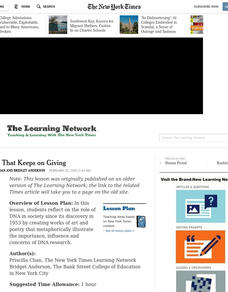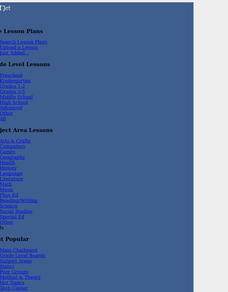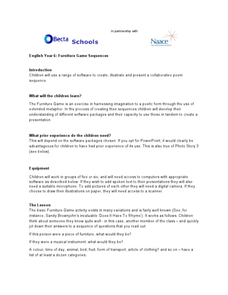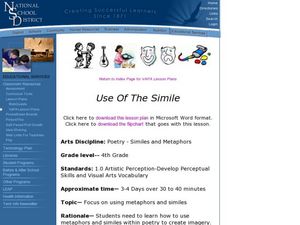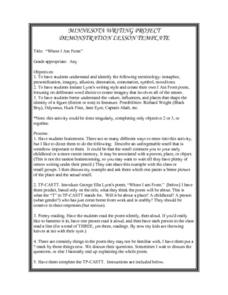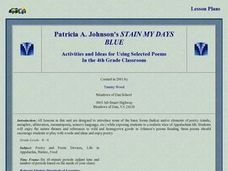Curated OER
Making Connections: I Know Why Caged Birds Sing
Students discuss equality and fairness by reading a Maya Angelo poem. In this U.S. history lesson, students read the poem I Know Why Caged Birds Sing, and discuss how the era it was written in affected the words. Students...
Curated OER
Rock & Roll through Literary Terms: An Upbeat Lyrical Adventure
Students participate in a variety of activities surrounding Rock & Roll music, lyrics, drama and visual art and how they all help demonstrate examples of literary terms. They use Rock & Roll as an effective aid to stimulate their...
Curated OER
Simile Stories
Fourth graders view song lyrics and identify similes in the song text. In this similes lesson, 4th graders define and identify similes on a worksheet. Students write their own similes using various adjectives.
Curated OER
A Walk Through the Past: A Grave Undertaking
Students explore how historians construct a story out of fragments of the past; a discussion of nineteenth century poetry and art leads students to connect art and literature to their place in time.
Curated OER
The Gift That Keeps on Giving
Students reflect on the role of DNA in society since its discovery in 1953 by creating works of art and poetry that metaphorically illustrate the importance, influence and concerns of DNA research.
Curated OER
Zen and the Work of Frank Lloyd Wright
Young scholars experience Zen philosophies reflected in artwork, poetry, and architecture. Students will explore these connections and expand the discussion to include a professional author of their choice.
Curated OER
Haunting Music
Young scholars discover music that was inspired by the spooky and bizarre. For this music of Hector Berlioz and Camille Saint-Saens lesson, students identify elements of music and listen to the Symphonie Fantastique and Danse...
Curated OER
Emotion Similes
Students define what a simile is before writing a poem that is based primarily on similes. They brainstorm and write the poem using the give format. They write drafts, revise and present a final poem.
Curated OER
Oliver/Kenyon
Students, through two pieces of writing, identify poetic/language devices through the speakers, personification , imagery, metaphor, etc. They assess the patterns those devices are used in and analyze the theme of each. Each student...
Curated OER
The Relationship Between Zen And Haiku Aesthetics
Students examine the principles of Haiku as they relate to idealss found in Zen Buddhism in this High School lesson. The lesson concludes with the creation of individual haikus by each student.
Curated OER
Figurative Language Scavenger Hunt
Eighth graders analyze and interpret figurative language. They listen to some examples of poetry which use figurative language. Then, they divide into groups and attempt to find more examples. Finally, 8th graders write what the poet is...
Curated OER
Flowers, Flowers, Flowers...A Visit with Georgia O'Keeffe
Students analyze, discuss, and research Georgia O'Keeffe and her flower paintings. They select a flower to paint and create a watercolor painting in the style of Georgia O'Keeffe. Students compose a poem describing their painting.
Curated OER
Original Line or Familiar Find?
Students examine a primary source document from 1684 that includes many of the same lines found in Romeo's speech to Juliet from Shakespeare's Romeo and Juliet. Students compare the texts and discuss authorship during the sixteenth and...
Curated OER
English Year 6: Furniture Game Sequences
Sixth graders create, illustrate and present a collaborative poem sequence using a variety of software.
Curated OER
Poetic Devices
In this figurative language worksheet, pupils read and study examples of simile and metaphor. There are 20 questions to be used with Smartboard and 10 questions in which students identify similes or metaphors.
Curated OER
Use of the Simile
Fourth graders identify and write their own similes. In this literary devices instructional activity, 4th graders define and identify similes. The teacher scaffolds the instructional activity so that all students can write their own...
Curated OER
Out of the Dust 4
Eighth graders read the novel, "Out of the Dust," and create a free-verse poem about a treasure of their own. They use the attached checklist to evaluate their own poem.
Curated OER
Awesome Alliterations
Learners review examples of alliteration in Shel Silverstein's poems. They are assigned a letter of the alphabet and then write an original alliterative poem using that letter.
Curated OER
Where I Am From
Students study selected poetry to gain an understanding of influences on values and personal identity. They explore language terms such as personification, imagery metaphors and allusion. After reading a poem and discussing it,...
Curated OER
Out of the Dust: Figurative Language
Students find examples of figurative language in "First Rain" in Out of the Dust. In this Out of the Dust lesson, students takes notes on various type of figurative language and identify examples of each type in the poem.
Curated OER
Ode to a Nightingale
Students read poems about Tuberculosis by John Keats. Using the poems, they identify similies, metaphors, personification and imagery. In groups, they make connections about the author's outlook on life and how his disease impacted his...
Curated OER
The Tell Tale Heart
Eighth graders explore storytelling by listening to a reading of a classic poem. In this language arts lesson, 8th graders listen to an audio recording of Edgar Allen Poe's The Tell-Tale Heart. Students examine the life of...
Curated OER
Octavio Paz
Tenth graders read and analyze the poem, "The Street," by Hispanic author, Octavio Paz. They research the life of Octavio Paz and identify his literary contributions. They complete an online scavenger hunt and create an author map of...
Curated OER
Stain My Days Blue
Students read several poems related to the life and culture of the Appalachia region. They are introduced to the poetic forms of simile, alliteration and onomatopoeia and respond to the poems through journal entries and poetry of their own.






